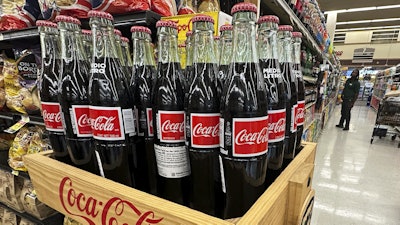
Coca-Cola said Tuesday it will add a cane-sugar version of its trademark cola to its U.S. lineup this fall, confirming a recent announcement by President Donald Trump.
Trump said in a social media post last week that Coca-Cola had agreed to use real cane sugar in its flagship product in the U.S., which has been sweetened with high fructose corn syrup since the 1980s. Coke didn't immediately confirm the change, but promised new offerings soon.
On Tuesday, Coca-Cola Chairman and CEO James Quincey said Coke will expand its product range "to reflect consumer interest in differentiated experiences."
"We appreciate the president's enthusiasm for our Coca-Cola brand," Quincey said in a conference call with investors Tuesday. "We are definitely looking to use the whole tool kit of available sweetening options."
Quincey noted that Coke uses cane sugar in some other U.S. drinks, like its Simply brand lemonade and Honest Tea. Coke has also sold Mexican Coke, which is made with cane sugar, in the U.S. since 2005.
"We're always looking for opportunities to innovate and see whether there's an intersection of new ideas and where consumer preferences are evolving," Quincey said. "It's a good sign that the industry, including ourselves, are trying lots of different things."
Rivals PepsiCo and Dr Pepper have been selling versions of their trademark colas sweetened with cane sugar in the U.S. since 2009.
Asked if Coke would also consider introducing a prebiotic version of its trademark cola — as PepsiCo did this week — Quincey said the company is currently selling a Coke with added fiber in Japan and is studying consumer response to it.
Quincey said consumer demand for its products improved in the second quarter in many markets, including China, Europe, Africa and North America.
"I would I would say overall that the global economy and the global consumer remains resilient," Quincey said.
But early monsoons and conflict hurt demand in India, and Quincey said demand in Thailand and Indonesia was also weaker than expected. Quincey also said lower-income consumers in the U.S. and elsewhere have also pulled back on spending.
Global case volumes of Coca-Cola fell 1%. Juice, dairy and plant-based beverages fell 4%, Coke said. Sports drink case volumes were down 3%, as higher demand in North America was offset by declines in Latin America.
One bright spot was Coca-Cola Zero Sugar, which saw case volumes grow 14%. Traditional Coca-Cola still far outsells the zero-sugar variety, but consumer demand for zero-sugar versions is growing much more quickly.
In North America, case volumes fell 1%, but that was an improvement from the first quarter, when they were down 3%.
Quincey said Hispanic sales in the U.S. returned to normal levels by the end of June. They had plummeted starting in February, when a social media video began circulating that claimed Coke was reporting its own workers to U.S. Immigration and Customs Enforcement officers.
Quincey said the claim was false. The company has been trying to win back Hispanic consumers with targeted deals and ads touting the company's local economic impact.
"It was still a headwind in the second quarter but the issue is now largely resolved," Quincey said Tuesday.
Coca-Cola reported better-than-expected earnings in the second quarter as higher prices offset the weaker volumes. Coke said pricing rose 6% globally.
Revenue for the Atlanta company rose 1% to $12.5 billion. Adjusted for one-time items, quarterly revenue was $12.6 billion. That was in line with Wall Street's forecast, according to analysts polled by FactSet.
Net income jumped 58% to $3.8 billion. Coke's adjusted net income was 87 cents, which was higher than the 83 cents Wall Street forecast.
Coke said it now expects full-year adjusted earnings to grow 8%. At the start of the year, Coke had expected earnings to grow 8% to 10%, but in April it lowered that range to 7% to 9%. Coke earned $2.88 per share in 2024.
Shares of Coca-Cola Co. were down 1% in early trading Tuesday.






















